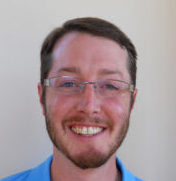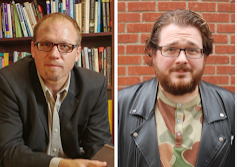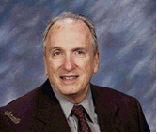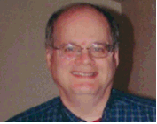Dear WesleyNexus
Colleague:
March has been a busy month for WesleyNexus dominated by four of our board members presenting papers at the Wesleyan Theological Society (WTS) meeting at Wesley Theological Seminary in Washington DC. The theme of the conference was Christian eschatology with topics ranging from biblical studies, to systematic theology and even theology and politics. The WTS is a society that seeks to “encourage the exchange of ideas among Wesleyan-Holiness theologians; acts as a source of ideas and essays for Christian Holiness Partnership seminars; stimulates scholarship among younger theologians, pastors, and inquiring laity.” The highlight of the March 2019 meeting occurred at the Friday evening banquet when Dr. Randy Maddox (Duke University Divinity School) received the Lifetime Achievement Award for his many contributions to Wesleyan theology. In presenting the award, Dr. Jason Vickers (Asbury Theological Seminary) noted that Dr. Maddox had “pioneered a more sophisticated and nuanced way of thinking about Wesley’s theology. In doing so, he influenced and inspired a whole generation of Wesleyan theological scholarship.” The Book of the Year Award for 2019 was presented to Dr. William J. Abraham (Southern Methodist University) for his 3-volume work, Divine Agency and Divine Action (Oxford University Press), and Bishop Sharma Lewis of the United Methodist Church was awarded the 2019 Pastor-Preacher-Scholar Award granted to outstanding leaders in the Wesleyan/Holiness tradition.
As an organization, the WTS focus on holiness does not appear at first glance to be a good fit for WesleyNexus participation. However, thanks to the initiative of our Advisory Board member, Dr. Thomas Jay Oord, WTS has been including a full section on Science and Theology during its last ten annual meetings. WesleyNexus had four papers approved for the Science and Theology sessions, two of which are referenced below with links in this month’s newsletter. By participating each year, we feel that we have presented perspectives that open the possibility for fruitful dialog for those who are interested in the nexus of science and faith.
At the same time as the WTS conference, Sam Kestenbaum wrote an article that described a disturbing trend taking place in our country, the wedding of religion, politics and end-times eschatology. The article focuses on the Beth Israel Worship Center led by a charismatic pastor named Jonathon Cahn who claims that Donald Trump becoming President of the United States was foretold in the Bible and that the apocalypse is just around the corner. While the article (found here) may be a bit jarring, it should not be surprising. As Rev. Dr. Eliezer Valentín-Castañón, pastor of Trinity United Methodist Church in Frederick, MD and WesleyNexus board member stated, “amazing to think that people will adhere to this type of theology but as the article said, it is not new. North American Christian eschatology has used every period of social crisis to come back to this idea that it is the end of times and that their “man,” chosen by God, is going to do what needs to be done.” While it may be poor theology, poor science and poor political ethics, it seems to be on the rise. WesleyNexus, however, affirms a different vision, a vision encapsulated by the concept of the Beloved Community. This term was coined by the philosopher Josiah Royce and later used by Martin Luther King. As highlighted by Carl Gregg’s article below, King replaced the idea of an otherworldly rapture for “a realistic, achievable goal that could be attained by a critical mass of people committed to and trained in the philosophy and methods of nonviolence.” We would also include scientific literacy as a necessary component as well. In this issue, we have included resources that we hope you find useful for we are all in this together, part of one world, where we must come together to address problems such as climate change, social distrust and economic injustice.
We are beginning
to plan our programs for the coming year and are still in need of funds to replenish our finances in order to continue for another
year. We will need your support and
hope you will consider helping us out. WesleyNexus is a 501(c)(3) charitable,
educational organization, and we will acknowledge all gifts from individuals
for tax reporting purposes. Thanks in advance for your support.
God Bless,
Rick, Maynard, and the rest of the
WesleyNexus Board of Directors
*********************************
What Do We Mean We When Say, “Building the Beloved Community”? by Carl Gregg

Rev. Carl Gregg is the minister of the Unitarian Universalist Congregation of Frederick since 2012 and is a frequent blogger on Patheos.com. In this article he addresses the importance of community within and between groups within our country. Referencing Martin Luther King, he points out that “he is not saying what we are often accustomed to hearing in our highly competitive society: that the end goal is a decisive — or even crushing — victory over our opponents. For King, building Beloved Community requires the even harder work of reconciliation, redemption, and being in right relationship, of “transforming opponents into friends.” In this time of conflict and incivility, it is helpful to be reminded what real community means. We as Wesleyans can take in Rev. Gregg’s hopeful message, for it is one consistent with our own tradition. The article from 2015 applies today as it did four years ago, and can be found here: https://www.patheos.com/blogs/carlgregg/2015/03/what-do-we-mean-we-when-say-building-the-beloved-community/
*********************************
The Open and Relational Theology Reading Group with Tripp Fuller and Tom Oord

Tripp Fuller and Tom Oord are two theologians who have leveraged social media to share discussions on theological topics. With this reading group, they offer six sessions focusing on the thinking of six different theologians coming from different backgrounds. “Tom and Tripp are both professional theologians and philosophers who love the life of the mind and the church. They enjoy reading, teaching, and wrestling with texts. That’s why they are launching this group for a number of years to reach out to ordinary people with podcasts.” Registration is required and an optional contribution requested as part of this registration. To gain access to past recordings and future programs, register here. https://homebrewedchristianity.lpages.co/ortseason1try2/
*********************************
John Wesley’s Eschatology as Informed by the Science of His Day by E. Maynard Moore

Maynard Moore, President of WesleyNexus, presented a paper at the Wesleyan Theological Society conference on March 15, 2019 at Wesley Theological Seminary. Moore focuses on John Wesley’s understanding of eschatology and argues that Wesley was not anti-science but instead, “testifies that the physical sciences confirmed his conviction that there is but One God, and strengthened his belief in Scripture; moreover, he attributes science as enriching his personal devotional life, and finally leads him to some of his most important theological convictions.” This paper includes several specific references to citations in the Royal Society publications to illustrate Wesley’s conviction that all men have the capacity to know God through their “natural endowments” and have the freedom of choice to act ethically based on this knowledge.” The article can be found here.
https://wesnex.org/wp-content/uploads/2019/03/MMoore20190315.pdf
*********************************
Insight, Beloved Community and Grace: Bringing Royce and Wesley Together by Rick Barr

In this paper, Rick Barr, one of the founding members of WesleyNexus, reflects on his journey as a participant in science and religion. Twenty years ago, Rick Barr started an exploration into the field of science and religion. Like many, the denominational orthodoxy he grew up with in the Methodist church did not seem adequate. This paper describes some of the results of that journey by first describing some of the key concepts acquired from science and religion engagement. The aim is to lay out what the philosopher Josiah Royce defined as insights and how those insights might enrich our interpretation of the world. He then moves on to Royce’s insight that reality, interpretation and community, what he termed the beloved community, go together. These insights are then compared with the Wesleyan notion of prevenient, reconciling and sanctifying grace. This model is not meant to replace prior notions of trinity or church tradition but to provide some insights on how to understand the faith for our time in the ongoing process of interpretation. The article can be found here.
https://wesnex.org/wp-content/uploads/2019/03/RBarr20190316.pdf
*********************************
Atheism Is Inconsistent with the Scientific Method, Prizewinning Physicist Says by Lee Billings
Marcelo Gleiser is the recipient of the 2019 John Templeton Prize which “celebrates no particular faith tradition or notion of God, but rather the quest for progress in humanity’s efforts to comprehend the many and diverse manifestations of the Divine.” Gleiser, Brazil-born theoretical physicist at Dartmouth College is a long-time participant in the science and religion dialog. In this Scientific American interview with journalist Lee Billings, Gleiser explains why he thinks that atheism is inconsistent with the scientific method. His basic response is that “the absence of evidence is not evidence of absence,” and all that. This positions me very much against all of the “New Atheist” guys—even though I want my message to be respectful of people’s beliefs and reasoning, which might be community-based, or dignity-based, and so on.” The full article can be found here:
*********************************
Beyond Conflict: Science, Faith and the Big Questions.

Biologos Conference, March 27-29, Baltimore, MD –
“As we explore the harmony between science and faith, we’re delighted to present some of the top scholars and communicators in the BioLogos community. You’ll hear from BioLogos founder Francis Collins, pastor and author John Ortberg, journalist Jonathan Merritt, astronomer Jennifer Wiseman, church historian Justo González, Oxford science-religion scholar Bethany Sollereder, BioLogos President Deb Haarsma, and more! Worship throughout the conference will be led by musician, author, and pastor Aaron Niequist”. Biologos extended early-bird registration and added fun new discounts for church and school groups, students, and ministry leaders. If you are unable to travel, take a moment to forward this email to your friends or college students on the east coast.
See discounts and register today at:
http://conference.biologos.org/conference-registration/
For more information, click here:
http://conference.biologos.org/
*********************************
Reminder
2019 IRAS Summer Conference: June 22-29 on Star Island

The 65th Annual Summer Conference sponsored by the Institute on Religion in an Age of Science is scheduled for June 22-29, 2019 in Star Island off the coast of Portsmouth, New Hampshire.
The CRISPR Apple on the Tree of Knowledge
Bioengineering, Gene Editing, and the Human Future:
Human gene editing is quickly outstripping the decision-making mechanisms we have in place for approving or regulating technology usage. The technology to directly manipulate the genomes of plants, animals and even humans is developing rapidly and is already in use. Can it be rationally managed and applied ethically? What are the medical, economic, environmental, and social consequences of genetic manipulation? At this conference, scientists, theologians, religious scholars and ethicists will offer illuminating and thought-provoking perspectives on the issues surrounding the gene-editing technology known as CRISPR. Scientists will explain the technique of gene editing with CRISPR and ethicists will ponder the impacts on society, from pest control to designer babies. What are the implications for agriculture and world hunger? What about medical advances that are too costly for most of the world? Theologians and religious scholars will discuss how we understand human nature and responsibility from within various religious traditions such as Christianity, Islam, Judaism, Buddhism and Hinduism. Most fundamentally, we will explore ethical issues such as therapy versus enhancement; species elimination versus global epidemic; germline intervention; and the long-term effects of bioengineering and genome editing that are within the realm of CRISPR possibility.
Star Island is offering free registration and full board and housing scholarships, including a “full ride” for some lucky person who registers BEFORE April 1, with a lottery drawing. This means there is no reason to wait: REGISTER NOW. Other discounts are available for new Conference participants, those who have never visited Star Island, and for families whose children participate in the certified children’s program. For more information go to the IRAS website www.iras .org.
